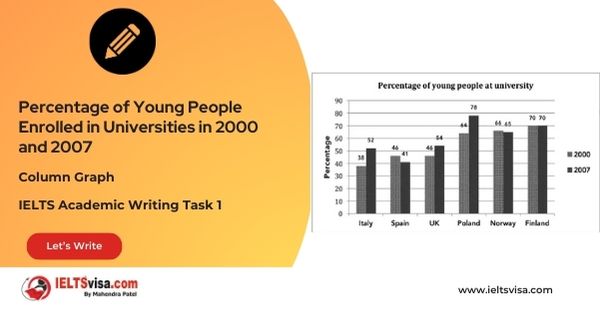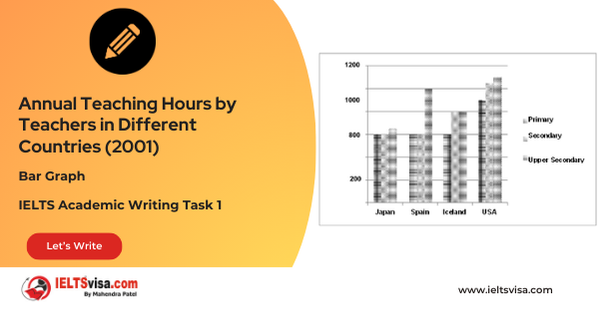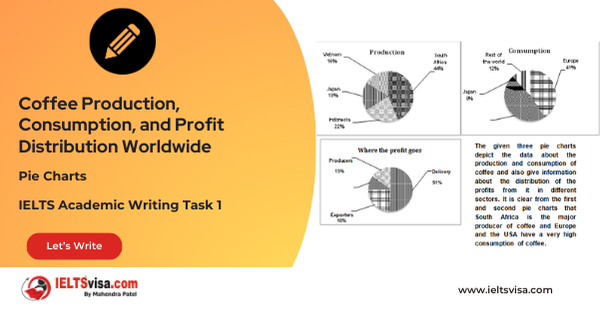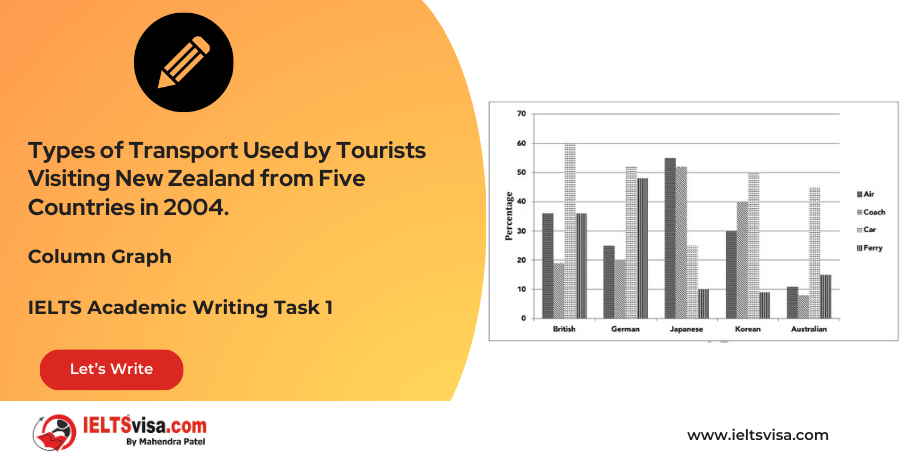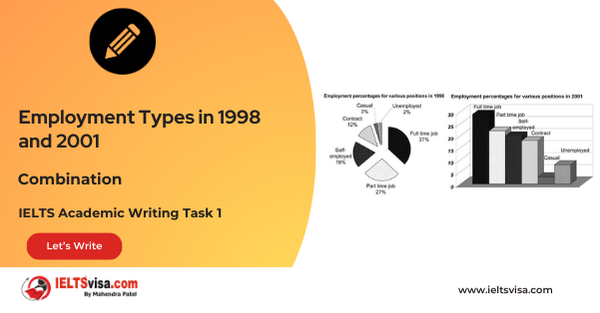Information about population of over 60-year-olds in six regions in 2000, and the predicted numbers of population over 60 in 2050
IELTS Academic Writing Task 1 - Tables
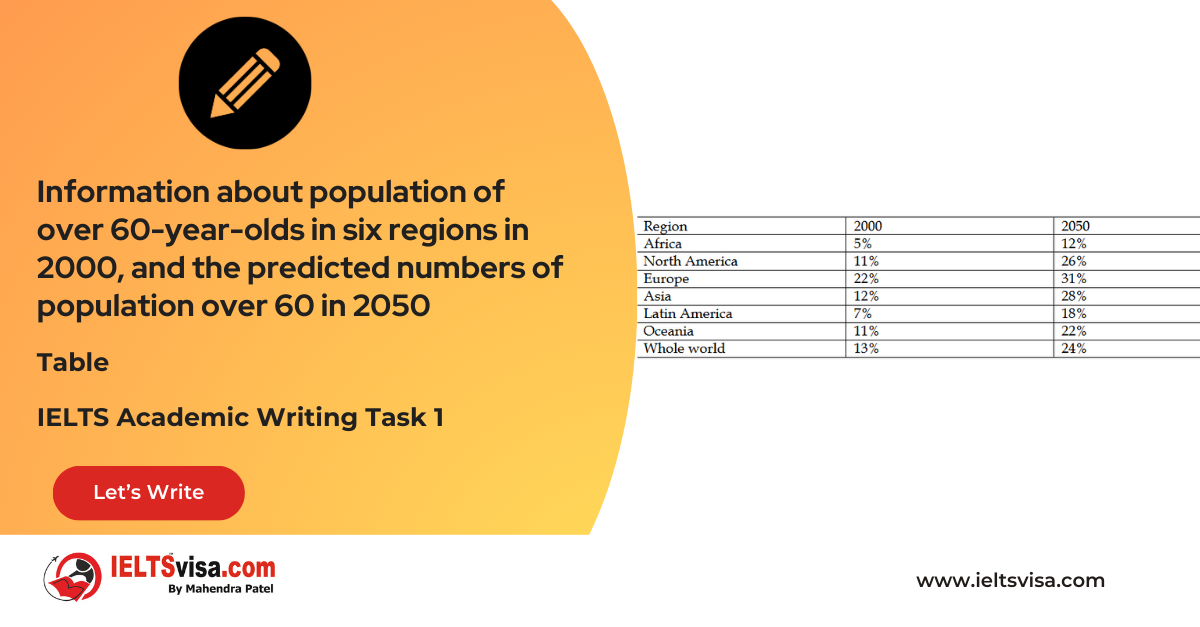
IELTS Writing Task 1 Question
The table below gives information about population of over 60-year-olds in six regions in 2000, and the predicted numbers of population over 60 in 2050. It also shows the world population over 60 in 2000 and 2050. Summarise the information in the following three tables and make comparisons where relevant.

Common Questions for the Table
1. Graph Type: Table
2. Title: Population Over 60 Years Old in Six Regions (2000 and 2050 Predictions)
3. What are the units of measurement?: Percentage of total population
4. Who: Population aged 60+ in six regions and globally
5. When: 2000 and 2050 (predicted)
6. Where: Africa, North America, Europe, Asia, Latin America, Oceania, and the World
7. Topic: Current and predicted percentage of over-60 population
Comparison Showing and Trends Any change over time (such as an increase or a decrease) is a trend.
Comparison 1 : Global and Regional Trends
- Details:
- Global: 13% in 2000, predicted to increase to 21% by 2050.
- Europe: The highest percentage was in 2000 (22%), and it is expected to grow to 31% by 2050.
- Africa: Lowest at 5% in 2000, predicted to more than double to 12% by 2050.
Comparison 2 :Similar Trends in Asia, Oceania, and North America
- Details:
- All regions had similar percentages (11–12%) in 2000.
- Predicted to nearly double by 2050 (20–24%).
Comparison 3 : Latin America (Significant Growth)
- Details:
- Started at 7% in 2000.
- Expected to grow two and a half times to 18% by 2050.
Sample Answer
The table compares the population aged 60 and above in six regions—Africa, North America, Europe, Asia, Latin America, and Oceania—in 2000 and the predicted figures for 2050. Additionally, it includes the global proportion of over 60 individuals in these years.
Overall, the percentage of over-60 populations is expected to increase significantly worldwide, with the largest growth in less developed regions.
Globally, 13% of the population was over 60 in 2000, a figure predicted to rise to 21% by 2050. Europe had the highest percentage of over-60s in 2000 at 22%, expected to reach 31% by 2050. Asia, Oceania, and North America had similar proportions (11–12%) in 2000, all predicted to double by 2050, reaching 20–24%.
Latin America had 7% of its population aged 60+ in 2000, with predictions of substantial growth to 18% by 2050. Africa had the smallest proportion of people over 60, at 5%, but this is expected to double to 12% by 2050.
Top 27 Vocabularies
| Vocabulary | Meaning | Synonyms | Examples | Type |
|
Predicted |
Expected to happen in the future |
Forecast, Projected |
The global percentage of over-60s is predicted to reach 21%. |
Adjective |
|
Proportion |
A part or share of a whole |
Percentage, Fraction |
Africa had the smallest proportion of over-60s in 2000. |
Noun |
|
Substantial |
Large or significant in amount |
Considerable, Major |
Latin America saw substantial growth in its over-60 population. |
Adjective |
|
Dramatic |
Noticeable and significant |
Remarkable, Striking |
Africa is expected to see dramatic growth in its over-60 population. |
Adjective |
|
Developed |
Having advanced economic and social systems |
Industrialized, Advanced |
Europe had the highest percentage among developed regions. |
Adjective |
|
Comparison |
The act of evaluating two or more things together |
Contrast, Evaluation |
The comparison showed differing trends in population growth. |
Noun |
|
Aged |
Having reached a certain age, typically older |
Elderly, Senior |
The aged population has been steadily increasing. |
Adjective |
|
Increase |
The process of becoming larger or greater |
Rise, Growth |
The increase in over-60 populations is projected to continue. |
Noun/Verb |
|
Proportionate |
Corresponding in size, degree, or intensity |
Equivalent, Balanced |
The population growth is proportionate across all regions. |
Adjective |
|
Significantly |
To a large extent or degree |
Substantially, Considerably |
The population of seniors will increase significantly. |
Adverb |
|
Forecast |
A prediction or estimate of future events |
Prediction, Projection |
The forecast for the next 30 years indicates a sharp rise. |
Noun/Verb |
|
Global |
Relating to the entire world |
Worldwide, Universal |
The global population of over-60s will grow by 8%. |
Adjective |
|
Diverse |
Showing a great deal of variety |
Varied, Different |
The regions showed diverse trends in their population growth. |
Adjective |
|
Subsequent |
Occurring or coming after something else |
Following, Succeeding |
The subsequent years saw a rapid increase in elderly populations. |
Adjective |
|
Trend |
A general direction in which something is developing |
Pattern, Movement |
There is a clear trend of increasing senior populations. |
Noun |
|
Projections |
An estimate or forecast of a future situation |
Forecasts, Estimates |
Projections for 2050 suggest major population shifts. |
Noun |
|
Ratio |
The quantitative relationship between two numbers |
Proportion, Rate |
The ratio of seniors to the total population will double. |
Noun |
|
Percentage |
A proportion expressed as a fraction of 100 |
Rate, Fraction |
The percentage of seniors in Europe is the highest globally. |
Noun |
|
Exponential |
Increasing rapidly and at a constant rate |
Accelerating, Steep |
The growth of the senior population is exponential. |
Adjective |
|
Cluster |
A group of similar things or people occurring together |
Group, Collection |
Many countries in Asia will cluster around the 20% mark by 2050. |
Noun |
|
Predominant |
Present as the strongest or main element |
Dominant, Leading |
Europe remains the predominant region for the senior population. |
Adjective |
|
Implication |
A possible future effect or result |
Consequence, Result |
The implications of this demographic shift are far-reaching. |
Noun |
|
Underdeveloped |
Lacking advanced infrastructure or resources |
Unindustrialized, Poor |
Underdeveloped regions are expected to see the fastest growth in seniors. |
Adjective |
|
Contributing |
To add or lead to a result |
Leading, Adding |
Several factors are contributing to the rise in elderly populations. |
Verb |
|
Decline |
A gradual or steady loss in quantity or quality |
Decrease, Deterioration |
A decline in birth rates has contributed to a rising senior population. |
Noun/Verb |
|
Rapid |
Occurring within a short time; fast |
Swift, Quick |
The rapid aging of populations in some regions is concerning. |
Adjective |

Our Books
Master IELTS Speaking Part 1
IELTS Writing Task 1 Book
IELTS Writing Task 2 Book
Writing Task 1 Question Types
Practice IELTS Other Modules
IELTS Listening
The IELTS Listening test assesses how well you can understand spoken English in various contexts. It lasts about 30 minutes and is divided into four sections with a total of 40 questions. The listening tasks become increasingly difficult as the test progresses.
IELTS Academic Reading
The IELTS Academic Reading section assesses your ability to understand and interpret a variety of texts in academic settings. It is designed to evaluate a range of reading skills, including skimming for gist, reading for main ideas, reading for detail, understanding inferences, and recognizing a writer's opinions and arguments.
IELTS Speaking
The IELTS Speaking test assesses your ability to communicate in English on everyday topics. It lasts 11-14 minutes and consists of three parts: introduction, cue card, and a discussion based on the cue card topic.
IELTS General Reading
IELTS General Reading tests your ability to understand and interpret various types of texts. Here are some key areas and types of content you can expect to encounter in the reading section, along with tips for effective preparation.
IELTS Academic Writing Task 1
In IELTS Academic Writing Task 1, you are presented with a visual representation of information, such as graphs, charts, tables, or diagrams, and you are required to summarize, compare, or explain the data in your own words.
IELTS General Writing Task 1
In IELTS General Writing Task 1, you are required to write a letter based on a given situation. The letter can be formal, semi-formal, or informal, depending on the prompt. Here’s a breakdown of the key components to include in your letter
IELTS Academic Writing Task 2
In IELTS Academic Writing Task 2, you are required to write an essay in response to a question or topic. Here’s a guide to help you understand the essential elements of this task
IELTS Exam Tips
To succeed in the IELTS exam, practice regularly, familiarize yourself with the test format, improve your vocabulary, develop time management skills, and take mock tests to build confidence.
Grammer for IELTS
Grammar is the foundation of effective communication in English. Understanding tense usage, subject-verb agreement, and sentence structure enhances clarity and coherence in writing and speaking.
Vocabulary for IELTS
Vocabulary plays a crucial role in the IELTS (International English Language Testing System) exam, especially in the Speaking and Writing sections. Here’s an overview of why vocabulary is important and how it impacts your performance
RECENT IELTS SAMPLES QUESTIONS AND ANSWERS
Task 1 – Column graph – Percentage of Young People Enrolled in Universities in 2000 and 2007.
20:00 Start Pause Stop [df_adh_heading title_infix="IELTS Writing Task 1 Question" use_divider="on"...
Task 1 – Bar Graph – Annual Teaching Hours by Teachers in Different Countries (2001)
20:00 Start Pause Stop [df_adh_heading title_infix="IELTS Writing Task 1 Question" use_divider="on"...
Task 1 – Pie Charts – Coffee Production, Consumption, and Profit Distribution Worldwide
20:00 Start Pause Stop [df_adh_heading title_infix="IELTS Writing Task 1 Question" use_divider="on"...
Task 1 – Column graph – Types of Transport Used by Tourists Visiting New Zealand from Five Countries in 2004.
20:00 Start Pause Stop [df_adh_heading title_infix="IELTS Writing Task 1 Question" use_divider="on"...
Task 1 – Bar and Pie Chart Combination – Employment Types in 1998 and 2001
20:00 Start Pause Stop [df_adh_heading title_infix="IELTS Writing Task 1 Question" use_divider="on"...
Task 1 – Diagram – Comparison of Stone Tool Development Over Time
20:00 Start Pause Stop [df_adh_heading title_infix="IELTS Writing Task 1 Question" use_divider="on"...

